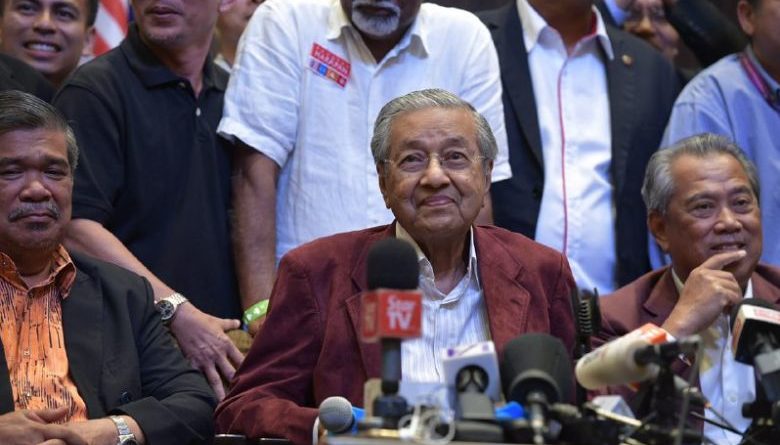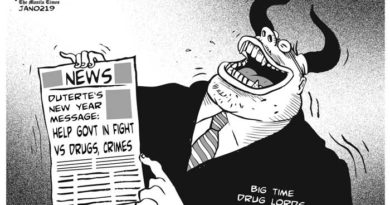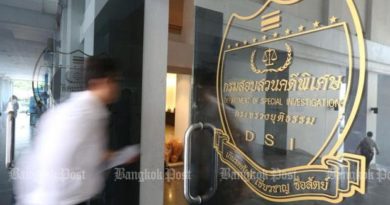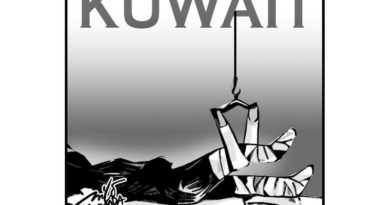OP-ED COLUMNIST: OPINION ON PAGE ONE – Can we have our own Mahathir?
MAHATHIR Mohammad, 92, became the world’s oldest political leader when he assumed office as Malaysia’s seventh prime minister on May 10, 2018. He had been prime minister before, for 22 years, and was seen to have “retired” after he was succeeded by his deputy, Abdullah Badawi, in 2003. In 2009, Badawi stepped down to give way to his own deputy, Najib Razak, the son of Malaysia’s second prime minister Tun Abdul Razak, and Mahathir’s defense and education minister, among other things.
Mahathir left a legacy of an economically prosperous and modernizing Malaysia close on the heels of Singapore, with a bureaucracy proud of its move from Kuala Lumpur to Putrajaya, the new administrative center. But under Najib, economic growth began to slow down as corruption rose and nasty scandals began to rock the government. These ultimately summoned Mahathir back from “retirement.”
Reconciling with Anwar
First, Mahathir organized his own party, then reconciled with Anwar Ibrahim, whom he had sacked as his deputy prime minister in 1999, and together they dealt Razak a crushing blow, ending the United Malays National Organization’s (Umno’s) stranglehold on power for more than 60 years.
Anwar remains in prison on a sodomy charge
Mahathir is the Asian statesman who openly sneered at the International Monetary Fund (IMF) and the currency speculator and “color revolution” specialist George Soros for their austerity prescriptions during the 1997-1998 Asian financial crisis. Instead of adopting the austerity measures, Mahathir imposed capital controls on the Malaysian ringgit, and declared Soros’ currency trading as “immoral, unnecessary, and unproductive.” Malaysia weathered the financial storm with flying colors, even as other economies plunged.
In 2015, Mahathir launched his fight against growing corruption under Najib. A $700 million fund had reportedly gone missing from the One Malaysia Development Berhad (1MDB), and was said to have shown up in accounts connected to Najib. Several billion ringgit more could not be traced. What particularly angered Mahathir was that while the United States and Singapore were quick to initiate investigations into the case, it was being quietly swept under the rug in Kuala Lumpur.
Najib barred from leaving
Until election day, Najib acted as though he was dealing with a spent force and remained confident of his staying power. But disaffection with his government had gone viral, and Pakatan Harapan, Mahathir’s “Alliance of Hope” with Anwar, took Malaysia by storm. As soon as Mahathir was sworn in, he immediately ordered Najib’s investigation, and barred him from leaving the country indefinitely.
Early police raids on residences linked to Najib yielded $29 million worth of cash in 26 currencies (mostly Malaysian ringgit and Singapore dollars) inside 35 bags, plus 37 bags of jewelry and watches. Subsequent police raids on two apartments occupied by Najib’s son and daughter, and a third unoccupied one, reportedly yielded 248 boxes of cash, jewelry, designer handbags, shoes and watches.
From Najib’s daughter Nooryana Najwa—who is married to a nephew of Kazakstan president Nursultan Nazarbayev—alone, police reportedly seized 150 handbags. These were Hermes bags, the most expensive in the high-end market, the reports said.
Imelda’s shoes trivialized
From May 21 to 23, 22 bank officers—21 from Bank Negara Malaysia, Malaysia’s central bank, and one from Bank Islam Malaysia—were reportedly involved in counting the stash, with the help of 11 counting machines. This completely trivializes the Western press’ story about Imelda Marcos’ shoes. During the ouster of Marcos and the sacking of Malacañang in February 1986, the Western press counted thousands of pre-worn shoes in Imelda’s closet as proof of her extravagance; but stacks of cash in 26 currencies? There was no such stash, although there were reports that some people helped themselves to some when they opened an official safe.
We could learn something from this. But this is not really what I mean when I speak of things we could learn from Mahathir. I refer more not only to how Mahathir got himself back, but above all to how he is handling himself, particularly in relation to China, which is the biggest problem of the Duterte government. I have met Mahathir a few times before, and in all instances I have been most impressed. I will cite three instances.
Erap’s move in KL
In 1998, Mahathir hosted the APEC summit in Kuala Lumpur. Then President Joseph Erap Estrada asked me to join his delegation, together with two other Senate colleagues. At this time, Anwar was already under prosecution and needed the help of friends. Erap was a friend, and during that visit Anwar’s devoted wife, Wan Azizah Wan Ismael, asked to see the President. My two colleagues advised in favor of a meeting, but I had my reservations. Although I considered Anwar a friend, I feared Erap’s most carefully arranged secret meeting with his wife would leak and personallyoffend Mahathir.
But Erap listened to my colleagues rather than to my apprehensions, and had his secret meeting. As I had feared, the meeting leaked, but Mahathir proved the perfect host and showed no sign of having ever heard of it at all.
Monogamous Muslim
In 2004, Doha hosted an international family conference in conjunction with the 10th anniversary of the UN International Year of the Family. Mahathir, no longer prime minister, was the keynote speaker. My wife and I were the only guests from the Philippines. In his keynote, Mahathir said that under Islamic law, a man may take four wives; but because Malaysia’s population was almost evenly split between men and women, he would be depriving three other males of their prospective wives if he took four for himself, so he decided to take only one. He was well applauded for this.
On one of his visits to Manila, I had a chance meeting with Mahathir. It was a Sunday afternoon, and my wife and I were on the top floor of Mega Mall. At the end of the hall, I saw a group of gentlemen, dressed in dark suits, walking in our direction. Curious, I approached and instantly recognized the PM. I asked what brought him to SM on a Sunday afternoon. “I’m looking at the furniture” he said, “to see what our people could reproduce at home.” I immediately remembered President Ramos in Saudi Arabia physically handling Philippine canned products during his meeting with Saudi businessmen.
A Filipino equivalent?
We do not have the exact equivalent of a Mahathir at his age. But assuming we had one, can you imagine us making him head of state or government? As a nation of over 100 million mostly young people, our bias tends toward the young. After Marcos fell, it was not uncommon to hear people say, “we’ve tried the brilliant and failed, why don’t we try the know-nothing this time?”
At 73, President Rodrigo Duterte is no longer a youngster, but he has aged largely chronologically, not morally nor intellectually. If a person’s maturity is characterized by self-knowledge, self-control and self-giving, then no one may accuse DU30 of being mature. He lacks the basic things he needs to have as part of his character, and he wears this serious lack like royal decorations. So does almost everybody else around him.
In electing the 92-year-old Mahathir, the Malaysians demonstrated their ability to elect a statesman where and when they needed one. This is something we have not done in a long time. We must learn it all over again. But there is something specific and urgent we must learn from Mahathir. It is, as I earlier mentioned, how to deal with Beijing. During the campaign, he not only denounced corruption, he was also equally critical of certain financial transactions with the Chinese government. Therefore at his first press conference in Kuala Lumpur, the first question asked of him was about his projected relationship with Xi Jinping.
Renegotiating with China
His answer could benefit DU30 as well. He said Malaysia may have overborrowed and it may be necessary to ask for a renegotiation of certain terms. He expressed confidence that China, having experienced the burden of unequal treaties with the British, would be ready to renegotiate certain unequal deals. At the same time, he expressed support for China’s One Belt, One Road project, suggested building longer trains to connect Asia to Europe, and doing away with warships which attract other warships and create unnecessary tension.
He also recalled that in October 2013 he and Xi created the Cheng Ho Association — after Admiral Cheng Ho (Zheng He), who led a huge armada of Chinese treasure ships to the West in the 15h century. The purpose of the Chinese expedition was to establish friendly relations with the West, unlike the Portuguese explorers—Vasco da Gama, Afonso Albuquerque and Diogo Lopes de Sequeira—-who came to Malacca in 1509 and conquered it two years later. China had been in the Malaccas for many, many years without any attempt at conquest. The association therefore was created to underscore peaceful cooperation between the two countries and this framework has not changed.
It is a position DU30 could adopt to correct the completely one-sided relationship between China and the Philippines. DU30 appears to have put the Philippines in hock to China, and is completely stymied in asserting its sovereign rights against Chinese military incursions into its exclusive economic zone. With Mahathir’s help and possibly Vietnam’s support, DU30 could perhaps talk to China, if he wants to, about the demilitarization of the Spratlys, where it has deployed cruise missiles. Despite his known quirks, DU30 may appreciate listening to Mahathir.
A working political model
But Mahathir could be of even greater help to Filipinos in search of a new leader. Filipinos are not sure they have a real leader in a strongman who brags openly about this ability “to kill.” In spite of DU30, or perhaps because of him, a leadership gap exists, and there are not enough who may be qualified or eager to fill that gap. This is not to say there will be a shortage of individuals who will be nominating themselves for the prize, with the help of Cambridge Analytica and good old Smartmatic.
But they will not be trying to imitate Mahathir, nor responding to the challenge hurled by outgoing Ombudsman Conchita Carpio Morales who said strong institutions, not strong men, are what this country needs. There is nothing earth-shaking in that quote: it is perpetually repeated in all our political statements. But the value of that quote lies in the fact that Morales, who is retiring on July 26, may still be made to pay a price for saying it, before or after she leaves office.
A cure for strongmen
Just as strongmen will not voluntarily remove themselves from the scene, strong institutions will not spring up like mushrooms after the rain. Strongmen who have violated every decency and rule of law, or betrayed the public trust will have to be removed by political or other means, and strong institutions will have to be built by constitutional, political, legal and moral means. These will be done by men and women of conviction and courage.
In speaking out, Morales showed both conviction and courage. Bully for her! There are learned men and women who know to what extent and in what ways the strongman has violated every human decency and rule of law, but they have decided to comfort and flatter him instead in the hope of receiving a sinecure, a multi-billion dollar contract, or some other personal favors. The country owes them nothing but the purest contempt!
Someone with the courage of his convictions should perhaps throw down the gauntlet now. But not having a 92-year-old like Mahathir, we may have to settle for someone a little younger. Will any septuagenarian or octogenarian risk it? [email protected] / BY FRANCISCO TATAD / ON
All photographs, news, editorials, opinions, information, data, others have been taken from the Internet ..aseanews.net | [email protected] |.For comments, Email to :D’Equalizer | [email protected] | Contributor.










